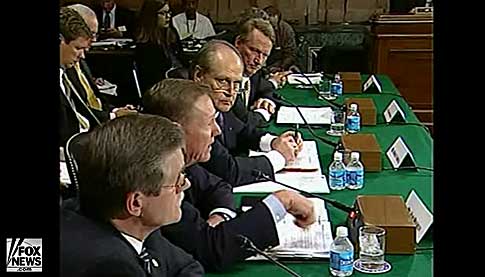FoxNews streaming Internet news feeds and the Senate committee with the big three automakers
Posted By RichC on November 19, 2008
 Tuesday evening was a fine time to try out the FoxNews Live Streaming feeds from the FoxNews.com website since they were broadcasting the hearing with the big three automakers. About the only disadvantage in watching these live streaming feeds is that occasionally the cameras pick up an odd face or set of eyes. ( partialscreenshot right) The video and audio quality of this live Internet feed was excellent and the conversation was actually pretty educational.
Tuesday evening was a fine time to try out the FoxNews Live Streaming feeds from the FoxNews.com website since they were broadcasting the hearing with the big three automakers. About the only disadvantage in watching these live streaming feeds is that occasionally the cameras pick up an odd face or set of eyes. ( partialscreenshot right) The video and audio quality of this live Internet feed was excellent and the conversation was actually pretty educational.

I found I agreed with Senator Bennett when he commented that it was sort of a “historic moment to hear labor representatives back company management” in some of the discussions. On the other hand, I was difficult to move beyond the restructuring problem associated with legacy employees and shrinking market share as competitors continue to erode into the big three domestic sales. According to one of the experts brought in, he continually pointed to the cost to ‘force retire’ employees at $130,000 each.  Although there was disagreement as to this legacy cost that the U.S. based foriegn manufacturers do not have, some of the other numbers associated with union employees were staggering.
Although there was disagreement as to this legacy cost that the U.S. based foriegn manufacturers do not have, some of the other numbers associated with union employees were staggering.
No matter what is done … and I believe something will be done … there need to be a change in how these companies are operated in keeping them (making them) competitive with foreign auto companies. Perhaps the “strings attached” loans needs to be coordinated with management salary adjustments and labor cost cuts AND some direct tax incentives for Americans choosing to purchase of a new vehicle?
Streaming feed from FoxNews.com worked flawlessly and was excellent quality. (The yelling at the end of the hearing was interesting as it was on the news feed, but more than likely not on the network coverage: “You’re a bunch of dinasours and you don’t know how to run and industry.”)
I’ll include the story posted after the hearing ended:
Big Three Automakers Beg Congress for $25B Lifeline
Auto executives warn of broader peril for the national economy if their companies are allowed to fail.
Detroit’s Big Three automakers pleaded with Congress on Tuesday for a $25 billion lifeline to save their once-proud companies from collapse, warning of broader peril for the national economy as well.
“Our industry … needs a bridge to span the financial chasm that has opened up before us,” General Motors CEO Rick Wagoner told the Senate Banking Committee in prepared testimony. He blamed the industry’s predicament not on failures by management but on the deepening global financial crisis.
But the new rescue plan appeared stalled on Capitol Hill, opposed by Republicans and the Bush administration who don’t want to dip into the Treasury Department’s $700 billion financial bailout program to come up with the $25 billion.
Sympathy for the industry was sparse.
Banking Committee Chairman Christopher Dodd, D-Conn., told Wagoner and leaders of Ford and Chrysler that the industry was “seeking treatment for wounds that were largely self-inflicted.”
Still, he said, “Hundreds of thousands would lose their jobs” if the companies were allowed to collapse.
Sen. Mike Enzi, R-Wyo., complained that the larger financial crisis “is not the only reason why the domestic auto industry is in trouble.”
He cited “inefficient production” and “costly labor agreements” that put the U.S. automakers at a disadvantage with foreign companies.
Wagoner said that despite some public perceptions that General Motors was not keeping pace with the times and technological changes, “We’ve moved aggressively in recent years to position GM for long-term success. And we were well on the road to turning our North American business around.”
“What exposes us to failure now is the global financial crisis, which has severely restricted credit availability and reduced industry sales to the lowest per-capita level since World War II.”
Failure of the auto industry “would be catastrophic,” he said, resulting in three million jobs lost within the first year and “economic devastation (that) would far exceed the government support that our industry needs to weather the current crisis.”
Congressional leaders worked behind the scenes in an effort to hammer out a compromise that could speed some aid to the automakers before year’s end. But the outlook seemed poor.
“My sense is that nothing’s going to happen this week,” Sen. Bob Corker, R-Tenn., said at the opening of the hearing.
Earlier, Majority Leader Steny Hoyer said Congress might have to return in December — rather than adjourning for the year this week, as expected — to push through an auto bailout.
“Dealing with the automobile crisis is a pressing need. We are talking about a lot of people … and a great consequence to our economy,” said Hoyer, D-Md.
The financial situation for the automakers grows more precarious by the day. Cash-strapped GM said it will delay reimbursing its dealers for rebates and other sales incentives and could run out of cash by year’s end without government aid.
In the Senate, Democrats discussed but rejected the option favored by the White House and GOP lawmakers to let the auto industry use a $25 billion loan program created by Congress in September — designed to help the companies develop more fuel-efficient vehicles — to tide them over financially until President-elect Barack Obama takes office.
“There was no indication that there was any traction” for the White House plan, Sen. Ben Nelson of Nebraska said after a Democratic caucus luncheon.
House Speaker Nancy Pelosi, D-Calif., and other senior Democrats, who count environmental groups among their strongest supporters, have vehemently opposed that approach because it would divert federal money that was supposed to go toward the development of vehicles that use less gasoline.
Instead, they want to draw the $25 billion directly from the $700 billion Wall Street bailout — bringing the government’s total aid to the car companies to $50 billion.
A Senate vote on that plan, which would also extend jobless benefits, could come as early as Thursday, but aides in both parties and lobbyists tracking the effort privately acknowledge it doesn’t have the support to advance. Treasury Secretary Henry Paulson renewed the administration’s opposition on Tuesday.
Even the car companies’ strongest supporters conceded Tuesday that changing the terms of the fuel-efficiency loan program might be the only way to secure funding for them with Congress set to depart for the year and the firms in tough financial shape.
“While I believe we have to have retooling going into next year, if in the short run the only way we have to be able to get some immediate help is to take a portion of that, I would very reluctantly do that — but only because I believe President-elect Obama is going to be focused on retooling and on a manufacturing strategy next year,” said Sen. Debbie Stabenow, D-Mich.
The White House said the government shouldn’t send any more money to the struggling auto industry on top of the already-approved loans.
“We don’t think that taxpayers should be asked to throw money at a company that can’t prove that it has a long-term path for success,” said White House Press Secretary Dana Perino.
Sen. Mitch McConnell, R-Ky., the minority leader, said that redirecting the existing loans was “a sound way to go forward,” and that he was working with Democratic Leader Harry Reid of Nevada to set a vote on such a plan.
“The auto industry obviously is very important, very important to my state, but there is a way to do this,” said McConnell, who has two Ford plants and a GM plant in his state.
Paulson, testifying on the House side, defended the administration’s handling of the massive $700 billion bailout for the financial industry and said it should remain off-limits for Detroit, no matter how badly the automakers need help.
“There are other ways” to help them, he said.
At the same time, he testified, “I think it would be not a good thing, it would be something to be avoided, having one of the auto companies fail, particularly during this period of time.”
The industry mounted a feverish lobbying effort to secure funds they said were vital to their survival — and the health of the broader economy. In an e-mail marked “urgent” and sent to owners of GM vehicles, Troy A. Clarke, president of GM North America, pleaded with them to e-mail their representatives in the House and Senate in support of a “bridge loan” for the industry — and ask their friends and family to do the same.
“Despite what you may be hearing, we are not asking Congress for a bailout but rather a loan that will be repaid,” Clarke said in the message.
That argument could be vital as bailout fatigue threatens to sap support for the carmaker aid.
Comments